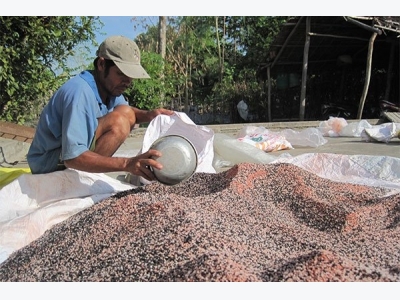Safeguard tariffs on fertilizer imports hit farmers

Farmers are struggling with higher fertilizer prices, sparked by the safeguard tariffs on imported DAP and MAP fertilizer - Photo: Trung Chanh
CAN THO – Vietnam’s safeguard tariffs on imports of diammonium phosphate (DAP) and monoammonium phosphate (MAP) fertilizer are delivering a blow to farmers as their farming costs are picking up.
On March 2, the Ministry of Industry and Trade issued Decision 686/QD-BCT taking safeguard measures against DAP and MAP fertilizer imports, with effect from March 7, 2018. The safeguard tariffs are VND1.13 million (US$49.6) a ton between March 7, 2018 and March 6, 2019, and a little more than VND1.07 million a ton from March 7, 2019 to March 6, 2020. They will be lowered to zero from March 7, 2020.
Vu Duy Hai, general director of VINACAM JSC, told the Daily that the safeguard tariffs are aimed at reducing DAP and MAP fertilizer imports as fertilizer is now subject to an import tariff of 6%, which is applicable to those countries having no bilateral trade agreements with Vietnam.
The decision is definitely sending fertilizer prices surging, Hai said.
Le Quoc Phong, former chairman and general director of Binh Dien Fertilizer JSC, said safeguard measures should be taken when import prices are far lower local levels. He asked why the safeguard tariffs are levied on imported DAP fertilizer whose price is higher than the locally-made product.
The high import and safeguard tariffs on DAP fertilizer will end up costing farmers, Phong noted.
In Tien Giang Province, DAP fertilizer imported from Australia is currently sold at VND600,000 per bag of 50 kilograms, way above VND470,000 in the same period last year. Imported DAP fertilizer has also marked up by VND120,000-130,000 per 50 kilograms.
Phong said the Ministry of Industry and Trade decision to slap the safeguard tariffs aims to protect local DAP fertilizer producers DAP Dinh Vu and DAP Lao Cai, which are under the management of the ministry.
Hai said domestic DAP fertilizer producers will benefit the most from the high tariffs as they could raise selling prices to maximize profits, meaning farmers would have to spend more on DAP and MAP fertilizer.
It is unfair for farmers to be forced to buy fertilizer at higher prices to save the loss-making DAP production plants after the Government decided not to use the State budget to fund such projects any more.
Phong proposed enhancing the quality of locally-made fertilizer products to keep pace with regional countries and China instead of imposing the safeguard duties.
Hai attributed the ineffective operation of the two above-mentioned DAP fertilizer plants to poor investment and backward technology which result in poor quality products.
Hai suggested lifting the safeguard duties on DAP and MAP fertilizer products. Meanwhile, fertilizer exporting countries might retaliate by taking the same measures against Vietnamese agricultural products.
Thus, farmers will have to buy fertilizer at high prices while their farm produce may be sold at low prices, especially when China imports up to half of Vietnam’s rice and Vietnam buys the most volume of fertilizer from the northern neighbor as well.
Related news
 Q&A: Infarm - the start of an urban farming revolution
Q&A: Infarm - the start of an urban farming revolution We chat with Erez Galonska, founder and CEO of Infarm – and innovative greenhouse that will bring farming into cities
 Berlin-based startup “INFARM” raises $25 million for vertical farming system
Berlin-based startup “INFARM” raises $25 million for vertical farming system Infarm, a startup that has developed vertical farming tech for grocery stores, restaurants and local distribution centres to bring fresh and artisan produce
 Lao Cai to develop 3.5ha hi-tech farms of lilies, roses
Lao Cai to develop 3.5ha hi-tech farms of lilies, roses The northern province of Lao Cai will use advanced technology to grow lilies and roses across a total area of 3.5 hectares in four wards and township of Sa Pa